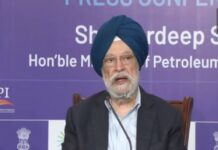Addressing the 7th G-STIC Delhi Conference on “Accelerating Technologies Solutions for the SDGs,” Hardeep Singh Puri, Minister of Petroleum and Natural Gas, articulated India’s evolving journey towards sustainable energy solutions. Highlighting the potential for these technological advancements to be replicated across the Global South, Shri Puri provided insights into the complexities of energy transitions within democratic frameworks, emphasizing that there is no clear answer to whether these transitions are inherently easier or more difficult in democracies.
The 7th G-STIC (Global Sustainable Technology and Innovation Community) Conference organized by TERI and VITO along with the support of eight other not-for-profit independent technology research institutes, is being hosted in India for the first time. The Conference will deliberate on challenges under the umbrella theme “Harmonizing Technology, Policy and Business Pathways for Sustainable Future and Coexistence”.
A highlight of the address was the substantial progress made in ethanol blending, which has surged from just 1.53% in 2013-14 to 16% today. This achievement has prompted the government to advance its blending target of 20% from 2030 to 2025, showcasing a proactive approach to energy sustainability. Shri Puri noted that discussions have already begun to establish a roadmap for sustainable energy solutions beyond the 20% blending target, indicating a forward-thinking strategy that anticipates future energy needs.
The Minister stressed the need for addressing the energy requirements of developing nations, particularly in the Global South, where many countries rely heavily on energy imports. He expressed confidence that the success of India’s ethanol initiatives could serve as a model for these regions, although he acknowledged that unlike Brazil, India lacks the luxury of abundant arable land for biofuel production. Nevertheless, he emphasized the potential for innovative biofuel strategies to alleviate import dependency while addressing local energy needs.
In his concluding remarks, Hardeep Singh Puri focused on the potential of green hydrogen as a game-changer for India’s energy landscape. He outlined the importance of local demand, production, and consumption in making green hydrogen a viable energy source. The key challenge remains in reducing the cost of production, and he called for ongoing innovation and scaling of technology in this sector.
Continue reading Chinimandi.com for more news about the Ethanol Industry.











